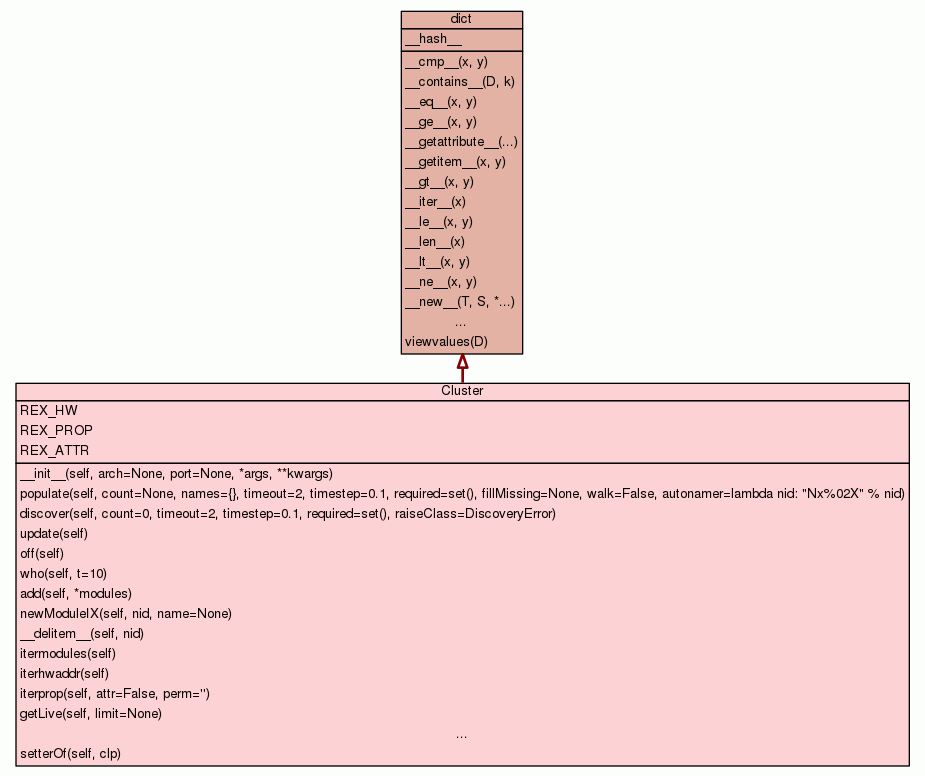
| Trees | Indices | Help |
|---|
|
|

Concrete class representing a CKBot cluster, which is a collection of modules residing on the same bus.
A Cluster contains a Protocol class to manage communication with the modules.
A Cluster instance is itself a dictionary of modules, addressed by their node ID-s. This dictionary is populated by the .populate() method. Clusters also implement the reflection iterators itermodules, iterhwaddr, and iterprop.
Typically, users will use the convenience attribute .at, which provides syntactic sugar for naming modules in a cluster using names defined when the cluster is .populate()-ed. These allow ipython tab completion to be used to quickly explore which modules are available.
Typical use:
>>> c = Cluster() >>> c.populate(3,{ 0x91 : 'left', 0xb2 : 'head',0x5d : 'right'} ) >>> for m in c.itervalues(): >>> m.get_od(c.p) >>> c.at.head.od.set_pos( 3000 ) # via object dictionary >>> c.at.head.set_pos(4500) # via process message
|
|||
new empty dictionary |
|
||
|
|||
|
|||
| None |
|
||
|
|||
|
|||
|
|||
|
|||
|
|||
|
|||
|
|||
|
|||
|
|||
|
|||
|
|||
|
|||
|
|||
|
Inherited from Inherited from |
|||
|
|||
|
|||
|
|||
|
|||
|
|||
REX_HW = re.compile("([a-fA-F0-9]{2})(:)([a-fA-F0-9]{4})")
|
|||
REX_PROP = re.compile("([a-zA-Z_]\w*)(/)((?:[a-zA-Z_]\w*)|(?:0
|
|||
REX_ATTR = re.compile("([a-zA-Z_]\w*)(/@)([a-zA-Z_]\w*)")
|
|||
|
Inherited from |
|||
|
|||
|
Inherited from |
|||
|
|||
Create a new cluster. Optionally, also .populate() it
INPUT:
arch -- optional -- python module containing arch.Bus and
arch.Protocol to use for low level communication. Defaults
to DEFAULT_ARCH
Can also be a Protocol instance ready to be used.
Supported architectures include:
can -- CAN-bus CKBot 1.4 and earlier
hitec -- modified hitec servos
dynamixel -- Robotis Dynamixel RX, EX and MX
pololu -- pololu Maestro servo controllers
nobus -- software simulated modules for no-hardware-needed
testing of code.
port -- specification of the communication port to use, as per
ckbot.port2port.newConnection. port defaults to DEFAULT_PORT, and
is ignored if arch is an initialized AbstractProtocol instance.
This can be used to specify serial devices and baudrates, e.g.
port = 'tty={glob="/dev/ttyACM1",baudrate=115200}'
*argc, **kw -- if any additional parameters are given, the
.populate(*argc,**kw) method is invoked after initialization
ATTRIBUTES:
p -- instance of Protocol for communication with modules
at -- instance of the Attributes class.
limit -- float -- heartbeat time limit before considering node dead
_updQ -- list -- collection of objects that need update() calls
|
Tries to populate the cluster based on heartbeats observed on the bus.
Will terminate when either at least count modules were found or timeout
seconds have elapsed. While waiting, checks bus once every timestep seconds.
If timed out, raises an IOError exception.
If the bus already got all the heartbeats needed, populate() should
terminate without sleeping.
If provided, names gives a dictionary of module names based on their node
ID. Node IDs that aren't found in the dictionary have a name automatically
generated from the ID by calling autonamer.
INPUT:
count, timeout, timestep, required, fillMissing-- see self.discover()
fillMissing -- class / bool -- fills in any missing yet required modules
with instances of this class. If boolean true, uses MissingModule
NOTE: the nobus mechanism bypasses this; use nobus.NID_CLASS
names -- dictionary of Modules names based with node id as their key.
walk -- bool -- if true, walks each module to indentify its interface
autonamer -- names the modules if no names are given.
|
Discover which nodes are in the cluster. Termination condition for discovery is that at least count modules were discovered, and that all of the required modules were found. If this hasn't happened after a duration of timeout seconds (+/- a timestep), discover raises a DiscoveryError. In the special case of count==0 and required=set(), discover collects all node ID-s found until timeout, and does not return an error. INPUT: count -- number of modules -- if 0 then collects until timeout timeout -- time to listen in seconds timestep -- how often to read the CAN buffer required -- set -- requires that all these nids are found raiseClass -- class -- exception class to raise on timeout OUTPUT: python set of node ID numbers |
Allow stateful members to update; propagates to
|
Build the interface for a module
INPUTS
nid -- int -- node identifier for use on the bus
name -- string -- name for the module, or None if regenerating
an existing module whose name is already known
OUTPUTS
mod -- Module subclass representing this node
|
del x[y]
|
Use heartbeats to get set of live node ID-s
INPUT:
limit -- float -- heartbeats older than limit seconds in
the past are ignored
OUTPUT:
python set of node ID numbers
|
parse a class property name into head and tail parts
use this method to validate class property name syntax.
OUTPUT: kind, head, tail
where kind is one of ":", "/", "/@"
|
Obtain a getter function for a cluster property If property is not readable, returns a DelayedPermissionError |
Obtain a setter function for a cluster property If property is not writeable, returns a DelayedPermissionError |
|
|||
REX_PROP
|
| Trees | Indices | Help |
|---|
| Generated by Epydoc 3.0.1 on Thu Jan 4 16:46:17 2018 | http://epydoc.sourceforge.net |